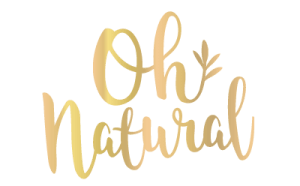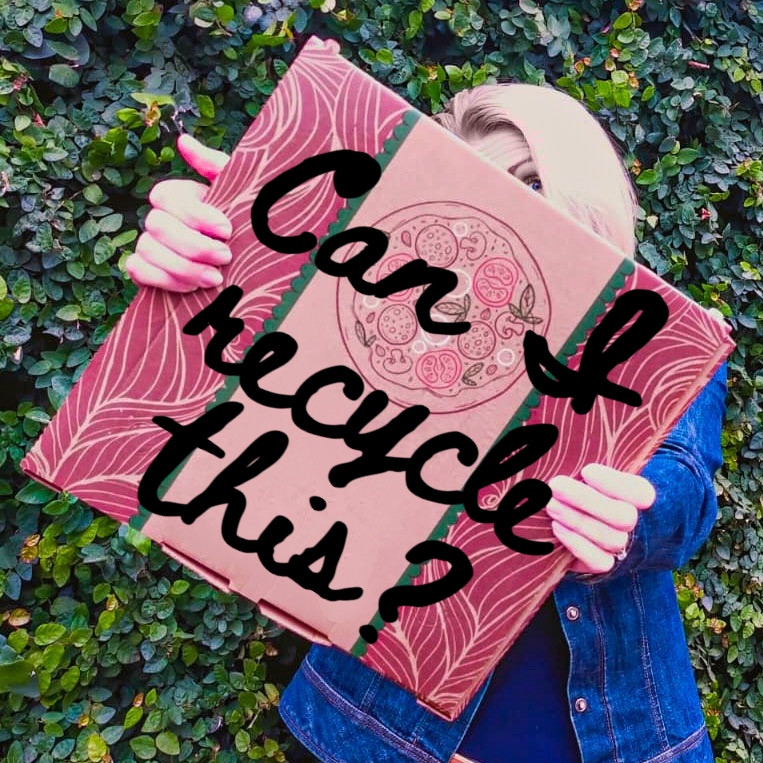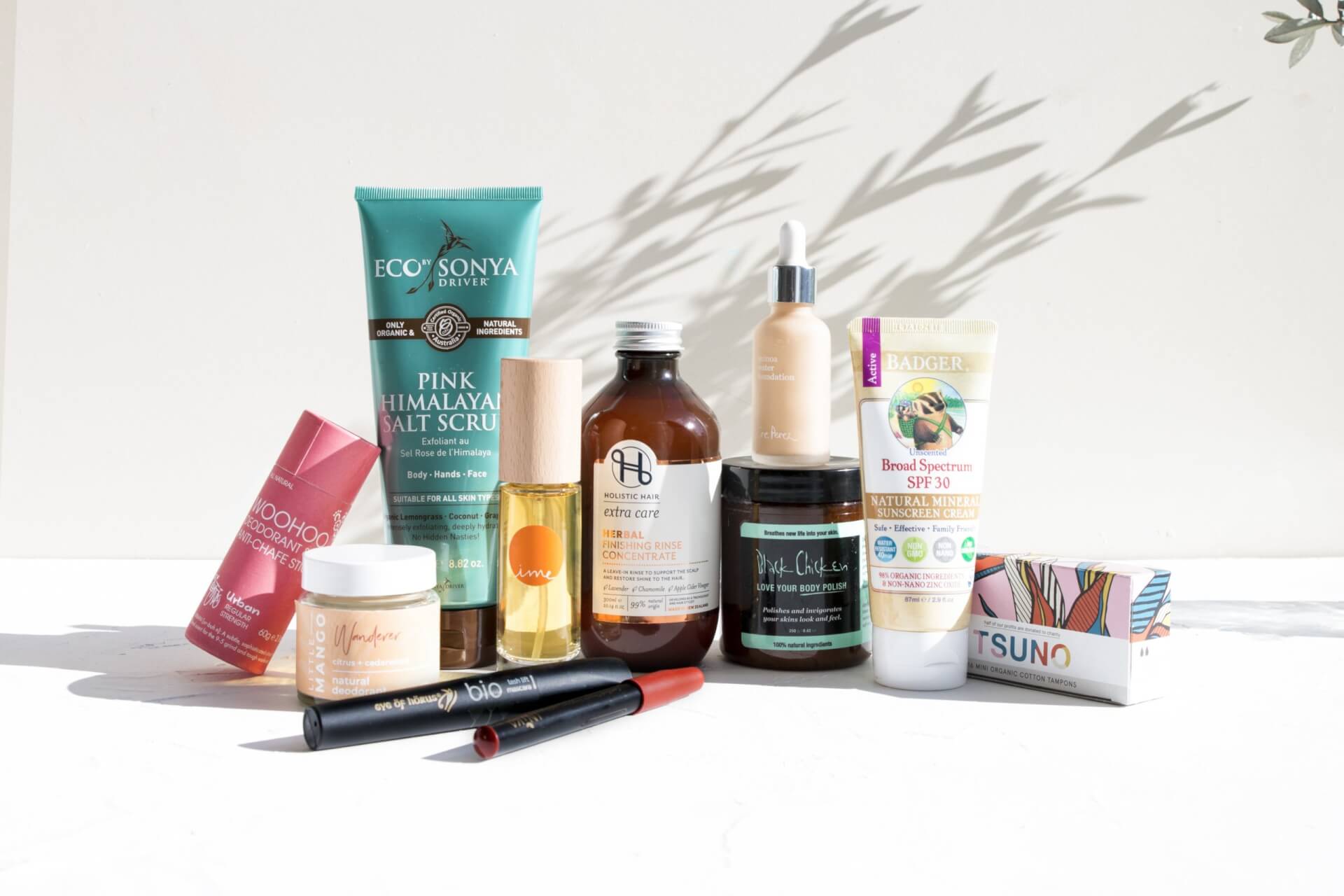Community, Home & Living, Lifestyle, Sustainability, Waste free, Words from Juliet Dale - The Great Eco Journey
Can I Recycle This? – From Juliet at The Great Eco Journey
“Which bin do meat trays go in?”
“Does this pizza box need to be clean?”
“Lid on or off?”
“What about tinfoil?”
“How about plastic #5?”
“CAN I RECYCLE THIS!?”
Knowing what can and can’t be recycled in your specific region can feel a bit like rocket science! So I’ve taken the hard work out of recycling for you. I’ve scoured the various recycling websites and apps, emailed waste specialists and contacted councils, and here it is, your comprehensive guide to what can and can’t be recycled in the different areas of NZ!
To get started, here are commonly confused items that CANNOT be recycled anywhere in NZ, along with some alternative ways to recycle or reuse them:
- Soft plastic – things like plastic bags, bubble wrap, cling film, ziplock bags, bread bags and food wrappers. NONE of these can go in your curbside recycling, no matter where in NZ you are. You can, however, recycle these separately through the Soft Plastic Recycling Scheme, depending on your location (currently available in Auckland, Waiheke Island, Northland, Waikato, Bay of Plenty, Hawkes Bay, Oamaru, Hauraki District, Taranaki, Christchurch and Wellington). These soft plastics are recycled here in New Zealand, and the majority are made into fence posts. Follow the link to find out exactly what you can recycle and where your closest drop off point is.
- Food scraps or garden waste – again, it doesn’t matter where you are in New Zealand, organic waste cannot go in your recycling bin. If you’re lucky enough to be in a region that has organic collections, pop it in there, or alternatively, consider composting! Or if composting is not an option for you, check out the Sharewaste App to see if someone else nearby can take your food scraps.
- Baby wipes, paper towels or tissues – paper towels can be composted.
- Shoes, clothes, or any other textiles (ie curtains) – you can donate shoes and clothes that are in good condition, chop up fabric to use as cloths / rags, or see if your local animal shelter can use them. Check out this Weird Recycling blog for some other recycling options for textiles.
- Broken glass or crockery – this needs to be wrapped and put in your rubbish bin. Or you could take up mosaic-making!
- Single-use coffee cups (regardless of what they’re made of) AND lids – despite the green-washing on these cups, they are not recyclable. Some are commercially compostable, but unless you can get them to a commercial composting facility, they need to go in your rubbish bin. There are some great alternatives to single-use cups; investing in a reusable cup, making one from a jar, taking a mug from home/work, or sitting down and enjoying your coffee at the cafe.
- Receipts – most receipts are printed on thermal paper, which cannot be recycled, any that are printed on paper made from trees can be composted or recycled.
- Nappies – just no.
- Lightbulbs
- Artwork – that has glitter, hot glue or beads attached to it (kids’ artwork with paint, pencil, crayon, felt is recyclable). This could also be reused into making more craft!
- Batteries and e-waste – these definitely can’t go in your recycling bin, however, there are an increasing number of e-waste recyclers popping up. Check out this blog I wrote to find your closest e-waste recycler.
- Building materials – check out this article on ways to reuse and recycle building materials.
- Candles
- CDs – you could reuse them for craft – see inspiration here
- Cellophane – If it’s in good condition it could be reused for wrapping gifts
- Chemicals – check out Consumer’s guide to disposing of hazardous chemicals.
- Cooking utensils – if they’re in good condition these can be donated to a second-hand shop or given away.
- Cottonwool – if it is 100% cotton then it is compostable. However, if you have used it with chemicals, such as nail polish remover, disinfectants or oily cosmetics, then it needs to go in the bin.
- Unwanted crockery, glassware and pyrex – how about donating them to your local charity / op shop?
- Medical waste – you can return unused medicines to your pharmacist for them to safely dispose of, contact your local pharmacy for more info. Contact your local medical centre for information on how to dispose of other medical waste that could be hazardous.
- Bottle and jar seals
- Paint and paint containers – check schemes run by Resene and Dulux.
- Photos – These can be cut up and used for craft e.g cut the photos up into thin strips, paste them randomly onto paper / cardboard they cut out shapes and use them for making cards, christmas decorations etc.
- Plastic items with no recycling number
- Pringles cans
- Polystyrene and polystyrene meat trays – see theWeird Recycling blog for recycling options.
- Rope, twine and string – if it’s made from organic fibres then it can be composted.
- Rubber bands – reuse them! Also, rubber bands are compostable, but take quite a long time to break down so you may need to cycle them through your compost more than once.
- Stationery – see Weird Recycling blog for recycling options.
- Toothpaste tubes and toothbrushes – see the Weird Recycling blog for recycling options.
- Toys – if they’re still up to being loved or played with by another child, how about donating them to your local charity or op shop?
- Wrapping paper that is metallic or glittery – reuse it if you can!
- Egg cartons – if they are made from recycled paper they can’t be recycled again but these can be composted.
On the other hand, these items CAN be recycled in any NZ curb-side recycling bin:
- Aluminium cans
- Aluminium containers – make sure they are rinsed
- Glass bottles – but check table below for lids.
- Books – including school exercise books. You don’t need to remove the staples.
- Cardboard – small amounts of tape or labels don’t need to be removed and only cardboard that is not soiled can be recycled. if it is soiled it may be able to be able to be composted (as along as it doesn’t have any chemicals etc)
- Cardboard tubes – toilet and paper towel inner tubes.
- Glass jars – check table below for lids.
- Magazines – you don’t need to remove the staples.
- Newspaper – this can also be composted and it can’t be soiled.
- Non-metallic / non-glittery wrapping paper
- Paper – only paper that is not soiled can be recycled, if it is soiled it may be able to be able to be composted (as along as it doesn’t have any chemicals etc)
Now we get to the items that often cause the most confusion because they vary from council to council. I’ve created a table below to summarise what items can and cannot be recycled in what regions. I’ve included the nine most populated regions in New Zealand, but if you fall outside of these, you can find the link to your council’s recycling information here.
Recycling by region in NZ:
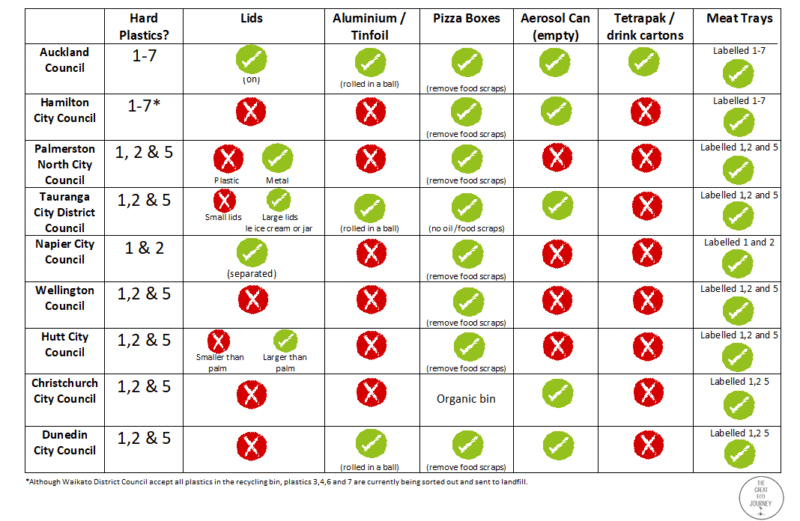
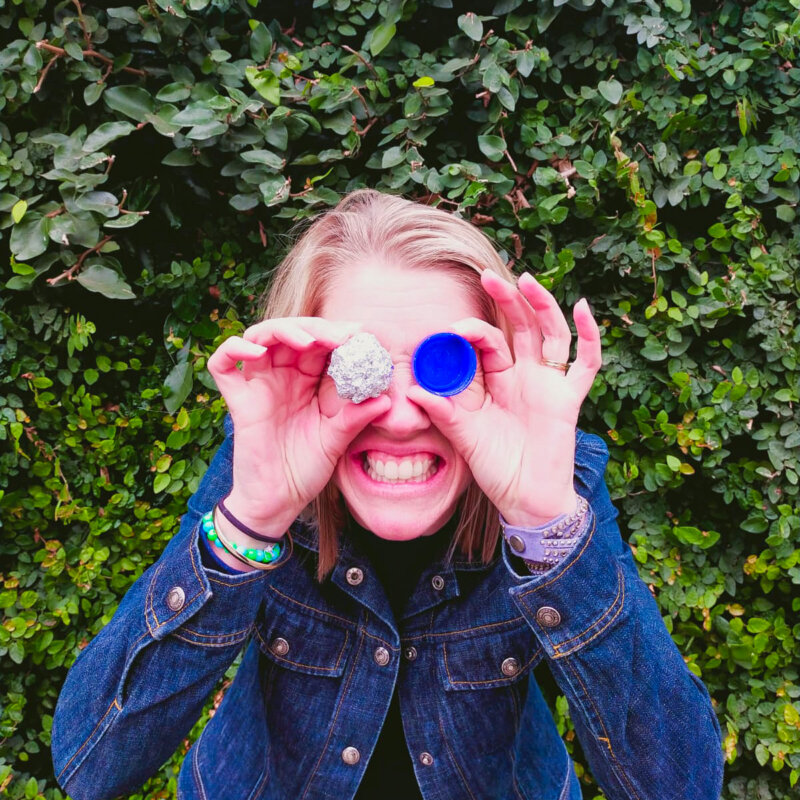
If you’re looking for some more information on recycling in your region, below are some links to websites or apps that I found very useful when hunting for answers. Most of them have a directory where you can search up particular items to find out whether or not they can be recycled. Just click on your region below:
Auckland Hamilton Palmerston North Tauranga Napier Wellington Hutt City Christchurch Dunedin
Also, feel free to add any questions or comments below, we would love to hear any tips etc you have! Happy recycling!
Juliet is the founder of The Great Eco Journey You can follow along with her & her family’s journey on Instagram & Facebook
